THE HEARTS & MINDS BOOKSTORE 2014 BEST BOOKS AWARDS: PART THREE
You may not be old enough to remember when TV sets would go blank with some fuzzy message instructing viewers to “stand by” due to technical difficulties. Well, we’ve had our share of difficulties of one sort or another — not to mention the regular demands of post-holiday work and some much needed post-holiday binge-watching. (I’m teaching a class at church on pop culture, after all.) But I digress. I wanted to thank you for standing by.
So, now, here we go — the home stretch, a bonus reel, if you’d like, of some of the most intriguing, rewarding, helpful, fun, valuable, notable books of this year of our Lord, 2014. Part One can be found at our website, here; Part Two was posted here.
Now, we are back to our regularly scheduled program, without interruption.
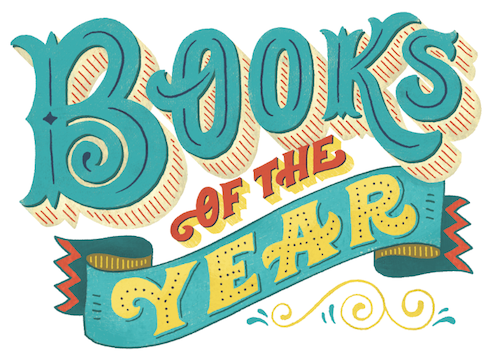
A VERY HONORABLE MENTION FOR ONE OF THE VERY BEST BOOKS OF THE YEAR — PART MEMOIR, PART REFLECTION, PART SOLID TEACHING
 Teach Us To Want: Longing, Ambition and the Life of Faith Jen Pollock Michel (IVP) $16.00 I cannot say enough about this book, and we have tried to press it into people’s hands more often then most books this year. It is, quite simply, brilliantly told, deeply thoughtful, and very moving. She is a very good writer, and she is candid, even raw, in moments, in ruminating on this very big question: is it wrong to want? Should Christians have worldly desires? Is ambition wrong? What, really, is this thing called desire? Rebekah Lyons writes of it, “We often feel the urge to hide our longings, especially in the church. Through her own story of fear, loss, and God’s goodness, Jen Pollock Michel stirs us to recover and reshape these desires in light of the Kingdom of God.” Exactly. And any book that can do this, deserves to be honored. Better, it enjoys to be read and discussed. I hope you buy this book, and invite you to enjoy us in celebrating it as a major contribution to Christian publishing this year. By the way, Christianity Today editor Katelyn Beaty — herself a great writer! — has a very good foreword. It sets the stage nicely, and is itself worth reading. Bethany Jenkins (of The Park Forum, an online devotional community in NYC) says “seriously, one of the most beautiful nonfictions books I have ever read.” And the fantastic writer Leslie Leyland Fields says “I’ve been waiting for this book for a very long time. Congratulations to all involved, the her.meneutics blog women, the IVP Crescendo imprint, and the good editors at IVP.
Teach Us To Want: Longing, Ambition and the Life of Faith Jen Pollock Michel (IVP) $16.00 I cannot say enough about this book, and we have tried to press it into people’s hands more often then most books this year. It is, quite simply, brilliantly told, deeply thoughtful, and very moving. She is a very good writer, and she is candid, even raw, in moments, in ruminating on this very big question: is it wrong to want? Should Christians have worldly desires? Is ambition wrong? What, really, is this thing called desire? Rebekah Lyons writes of it, “We often feel the urge to hide our longings, especially in the church. Through her own story of fear, loss, and God’s goodness, Jen Pollock Michel stirs us to recover and reshape these desires in light of the Kingdom of God.” Exactly. And any book that can do this, deserves to be honored. Better, it enjoys to be read and discussed. I hope you buy this book, and invite you to enjoy us in celebrating it as a major contribution to Christian publishing this year. By the way, Christianity Today editor Katelyn Beaty — herself a great writer! — has a very good foreword. It sets the stage nicely, and is itself worth reading. Bethany Jenkins (of The Park Forum, an online devotional community in NYC) says “seriously, one of the most beautiful nonfictions books I have ever read.” And the fantastic writer Leslie Leyland Fields says “I’ve been waiting for this book for a very long time. Congratulations to all involved, the her.meneutics blog women, the IVP Crescendo imprint, and the good editors at IVP.
A VERY HONORABLE MENTION FOR ONE OF THE VERY BEST BOOKS OF THE YEAR — A CALL TO FAITH, OBEDIENCE AND HOPE FOR SOCIETAL RENEWAL
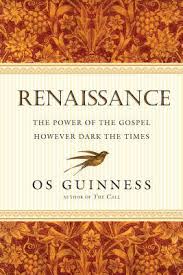 Renaissance: The Power of the Gospel However Dark the Times Os Guinness (IVP) $16.00 This stellar book deserves much awarding, many honorable mentions, some serious accolades and hip hoorays. I am impressed, as I always am, by the sheer power of Guinness’ vocabulary, his clarity and precision, and his immense learnedness. He is a strong thinker and excellent communicator. This would be an award winning book just for the power of the language, the goodness of the writing — readers, writers, preachers, artists, take note: this is one way it is admirably done, and it is a good way. Study him and learn; the pages are serious, crisp, erudite, solid, astute. So we are glad for the form and style of this wonderful book, which (by the way) is trim sized and feels nice in the hand. It is not too weighty and designed in a way that is classy, as befits a book like this, by an author like this. However, the more important matter is the content, the way in which Guinness can invite us, indeed challenge us, to be faithful to first things, to examine the threats to orthodox faith and the ways in which we tend to misconstrue the Bible’s key themes when it comes to social change. This really is a very foundational book, reminding us how the gospel alone can change cultures (as it has, and as it must.) From very sharp British scientists like John Lennox to serious literary scholars such as David Lyle Jeffrey, to the impressive pastor and preacher Tim Keller, this book has been called “penetrating” and “rich” and “astute” and “at once a stinging indictment of cultural idolatry in the Christian Wet and a clarion call to renewal on the model of Christ in the Gospels and the witness of the apostles.” Keller says “for decades, Os Guinness has been one of the most nuanced, realistic, yet hopeful voices calling Christians to engagement with the culture. This latest volume from him should not be missed by anyone.”
Renaissance: The Power of the Gospel However Dark the Times Os Guinness (IVP) $16.00 This stellar book deserves much awarding, many honorable mentions, some serious accolades and hip hoorays. I am impressed, as I always am, by the sheer power of Guinness’ vocabulary, his clarity and precision, and his immense learnedness. He is a strong thinker and excellent communicator. This would be an award winning book just for the power of the language, the goodness of the writing — readers, writers, preachers, artists, take note: this is one way it is admirably done, and it is a good way. Study him and learn; the pages are serious, crisp, erudite, solid, astute. So we are glad for the form and style of this wonderful book, which (by the way) is trim sized and feels nice in the hand. It is not too weighty and designed in a way that is classy, as befits a book like this, by an author like this. However, the more important matter is the content, the way in which Guinness can invite us, indeed challenge us, to be faithful to first things, to examine the threats to orthodox faith and the ways in which we tend to misconstrue the Bible’s key themes when it comes to social change. This really is a very foundational book, reminding us how the gospel alone can change cultures (as it has, and as it must.) From very sharp British scientists like John Lennox to serious literary scholars such as David Lyle Jeffrey, to the impressive pastor and preacher Tim Keller, this book has been called “penetrating” and “rich” and “astute” and “at once a stinging indictment of cultural idolatry in the Christian Wet and a clarion call to renewal on the model of Christ in the Gospels and the witness of the apostles.” Keller says “for decades, Os Guinness has been one of the most nuanced, realistic, yet hopeful voices calling Christians to engagement with the culture. This latest volume from him should not be missed by anyone.”
We need not wring our hands — although being on our knees a bit more wouldn’t hurt — and we don’t have to fuel the fires of the culture wars. This fine book reminds us that “to change the world” we must seek a Godly renaissance. I hope you hear me on this: this is one of the Best Books of 2014 and deserves a very wide readership. There is a prayer at the end of each chapter, and very good discussion questions. It ends with an “evangelical manifesto.” We must learn “the dynamics of the Kingdom” (as he puts it)ponder how to take courage and live out faith in practice in all of life.
BEST SELF PUBLISHED BOOK OF 2014
 A Movable Feast: Worship for the Other Six Days Terry Timm (ImaginationPlus) $11.99 I award this the “best self published book” to underscore the indigenous energy and creative efforts of this amazing, tireless leader (and very fine writer.) It is a truly good book, well designed (way to go Phil Mollenkof.) I hope you realized that I’ve mentioned this out loud at a few events this fall, and I hope you recall that I wrote about it at BookNotes. You may recall that I respect Pastor Timm a lot, and that he is doing excellent work in the suburbs of Pittsburgh, with a special ministry (may his tribe increase!) helping his congregants think Christianly about their callings and careers. They have brought people the five hours to Hearts & Minds to have me help them find books around their various passions and professions, and they have paid to have me visit with them, helping curate a list of books for their particular needs. Well, who does that? And why? This is why: if one worships well, if one is truly attracted to adore Christ as Lord, then this Sunday morning stuff will spill over into a life well lived. Terry Timm is a new kind of leader, it seems, truly running with this recent interest in work, vocation, calling, and the “other six days” of the whole people of God, for the life of the world. But he starts at the beginning, the worship of the God who deserves praise. This is a great little book on renewal in worship for the sake of the calling of the people to serve as salt and light. Welcome to the feast.
A Movable Feast: Worship for the Other Six Days Terry Timm (ImaginationPlus) $11.99 I award this the “best self published book” to underscore the indigenous energy and creative efforts of this amazing, tireless leader (and very fine writer.) It is a truly good book, well designed (way to go Phil Mollenkof.) I hope you realized that I’ve mentioned this out loud at a few events this fall, and I hope you recall that I wrote about it at BookNotes. You may recall that I respect Pastor Timm a lot, and that he is doing excellent work in the suburbs of Pittsburgh, with a special ministry (may his tribe increase!) helping his congregants think Christianly about their callings and careers. They have brought people the five hours to Hearts & Minds to have me help them find books around their various passions and professions, and they have paid to have me visit with them, helping curate a list of books for their particular needs. Well, who does that? And why? This is why: if one worships well, if one is truly attracted to adore Christ as Lord, then this Sunday morning stuff will spill over into a life well lived. Terry Timm is a new kind of leader, it seems, truly running with this recent interest in work, vocation, calling, and the “other six days” of the whole people of God, for the life of the world. But he starts at the beginning, the worship of the God who deserves praise. This is a great little book on renewal in worship for the sake of the calling of the people to serve as salt and light. Welcome to the feast.
BEST BOOK ON THE WRITING LIFE
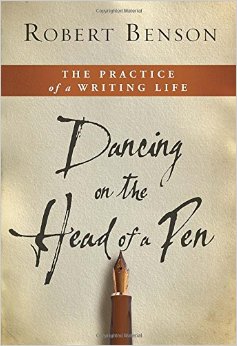 Dancing on the Head of a Pin: The Practice of the Writing Life Robert Benson (Waterbrook) $14.99 If Benson the Writer puts out a new book, I’m a-gonna read it. In fact, I was so eager to have this one, that I got out one of his spectacular books on prayer (Living Prayer) and then his lovely little memoir about vacationing in the Caribbean (Home Another Way), just to get in the mood and help me anticipate this new work. It is, as they say on the back, “a masterful blend of the practical and the spiritual…” which “invites you into the work and rewards of a writer’s life. I liked very much his clear-headed book about discerning his vocation to be a writer called The Echo Within and I commend it to anyone wanting a down-to-Earth story about finding one’s calling. But this, this is pure gold for anyone in the creative life, anyone who writes or wants to write. Phyllis Tickle gets it about right when she says it is written with “deceptive simplicity and an almost seductive easiness in his voice.” And I love that she explains this books wisdom and value by saying it “lays open before us the filigreed mystique of the writing life in all its beauty, its unmitigated angst, and its inescapable vocation.” I’d have awarded this one of my favorite reads of the year anyway, but being reminded of that, I want to give a unmitigated filigreed away of beauty and angst. Three cheers for Robert Benson. Love the cover, too; perfect! Namaste.
Dancing on the Head of a Pin: The Practice of the Writing Life Robert Benson (Waterbrook) $14.99 If Benson the Writer puts out a new book, I’m a-gonna read it. In fact, I was so eager to have this one, that I got out one of his spectacular books on prayer (Living Prayer) and then his lovely little memoir about vacationing in the Caribbean (Home Another Way), just to get in the mood and help me anticipate this new work. It is, as they say on the back, “a masterful blend of the practical and the spiritual…” which “invites you into the work and rewards of a writer’s life. I liked very much his clear-headed book about discerning his vocation to be a writer called The Echo Within and I commend it to anyone wanting a down-to-Earth story about finding one’s calling. But this, this is pure gold for anyone in the creative life, anyone who writes or wants to write. Phyllis Tickle gets it about right when she says it is written with “deceptive simplicity and an almost seductive easiness in his voice.” And I love that she explains this books wisdom and value by saying it “lays open before us the filigreed mystique of the writing life in all its beauty, its unmitigated angst, and its inescapable vocation.” I’d have awarded this one of my favorite reads of the year anyway, but being reminded of that, I want to give a unmitigated filigreed away of beauty and angst. Three cheers for Robert Benson. Love the cover, too; perfect! Namaste.
BEST NOVELS OF 2014
Beth and I thought this thru, and we agreed it should be a runner up, although she slightly favored the Sue Monk Kidd for being a bit more interesting, with a more complex plot and more characters. But both certainly deserve our thanks and our honorable mention.
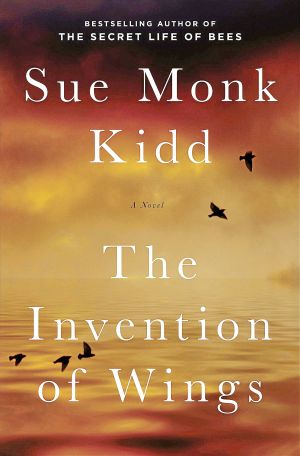
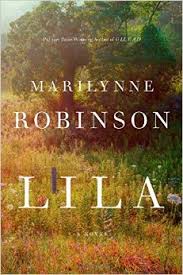 The Invention of Wings Sue Monk Kidd (Viking) $27.95 The stunning, fabulous story of Sarah Grimke, the abolitionist, and the slave she owned as a child, Hetty “Handful.” Sue Monk Kidd is a great writer and thoughtful person of deep faith. Exceptionally informative, moving, quite a story!
The Invention of Wings Sue Monk Kidd (Viking) $27.95 The stunning, fabulous story of Sarah Grimke, the abolitionist, and the slave she owned as a child, Hetty “Handful.” Sue Monk Kidd is a great writer and thoughtful person of deep faith. Exceptionally informative, moving, quite a story!
Lila Marilynne Robinson (Farrar, Straus & Giroux) $26.00 You know that Ms Robinson won the Pulitzer Prize for the first book in this trilogy, Gilead, which was followed by the popular and also much-awarded Home. This recent one tells the story of the hardscrabble life of the mysterious wife of the pastor John Ames, the protagonist of Gilead. Robinson is often hailed as one of the best living novelists, and we are honored to honor her, and glad we stock all of her good work.
A SPECIAL AWARD OF GREAT MERIT: MY FAVORITE NOVEL READ IN 2014
The Signature of All Things Elizabeth Gilbert (Viking) $28.95 I will insist that this is not only the best novel I’ve read all hear, but one of the most unforgettable stories I have ever read. What fine, fine writing, what remarkable storytelling, what a fascinating, even troubling epic tale — one that even after 499 pages, I did not wish to end. Oh, how I will miss Alma Whittaker and her botanical studies. Although this story spans the globe, much of it is set in mid 19th century Philadelphia, and then in Tahiti, and then Holland. (Alma’s father was a helper on the journeys of Captain Cook in the late 1700s and became wealthy in what might be called the early multi-national pharmaceutical business.) The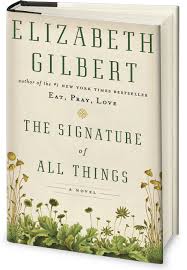 main character, Alma, is a botanist, and the book has as one of its many themes large questions about faith and science, about Darwin — whose work is going to be published to her keen interest nearer the end of the book. There are missionaries, mystics, abolitionists, and, yes, some eloquently described moments of exquisite sexuality. I was glad I had a very handsome hardback, with deckled pages and beautiful botanical drawings in the flyleaves, the sort that one of the characters in the book draws and publishes. (The hardcover was released in 2013, but the paperback came out in 2014.) I simply must share my own enthusiasm — Beth’s too, as she read it before I , and was very taken with it — for this magisterial, complex, epic story, written in nearly perfectly rendered, wonderfully realized, luminous prose.
main character, Alma, is a botanist, and the book has as one of its many themes large questions about faith and science, about Darwin — whose work is going to be published to her keen interest nearer the end of the book. There are missionaries, mystics, abolitionists, and, yes, some eloquently described moments of exquisite sexuality. I was glad I had a very handsome hardback, with deckled pages and beautiful botanical drawings in the flyleaves, the sort that one of the characters in the book draws and publishes. (The hardcover was released in 2013, but the paperback came out in 2014.) I simply must share my own enthusiasm — Beth’s too, as she read it before I , and was very taken with it — for this magisterial, complex, epic story, written in nearly perfectly rendered, wonderfully realized, luminous prose.
BEST POETRY VOLUMES
What do I know? I am admittedly out of my league here, but I had to underscore at least a few that I’ve spent some time with that I think deserve special commendation. What can I say?
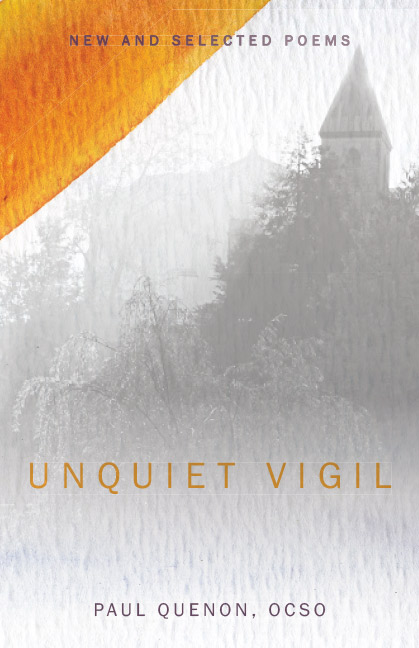 Unquiet Vigil: New and Selected Poems Paul Quenon (Paraclete Press) $19.99 Here is what it says on the back: “What tumbles through a monk’s mind in the course of a day? What might be gleaned while ranging high along the Kentucky knobs, or quietly emerge while sitting in the dark before dawn? Inner and outer landscapes form the poems in Unquiet Vigil.” These are very nice, very artful and quite moving; I enjoyed his opening essay, too. This poet-monk has been at this a long time; his Novice Master, Fr. Louis, was also a renowned poet. You may know him by his more public name, Thomas Merton. And, there is a blurb on the back by Maurice Manning who says “it is a joy to have this book.”
Unquiet Vigil: New and Selected Poems Paul Quenon (Paraclete Press) $19.99 Here is what it says on the back: “What tumbles through a monk’s mind in the course of a day? What might be gleaned while ranging high along the Kentucky knobs, or quietly emerge while sitting in the dark before dawn? Inner and outer landscapes form the poems in Unquiet Vigil.” These are very nice, very artful and quite moving; I enjoyed his opening essay, too. This poet-monk has been at this a long time; his Novice Master, Fr. Louis, was also a renowned poet. You may know him by his more public name, Thomas Merton. And, there is a blurb on the back by Maurice Manning who says “it is a joy to have this book.”
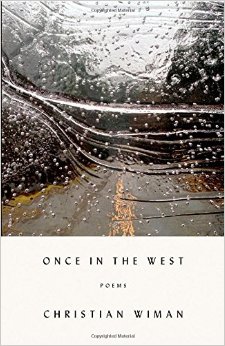
Once in the West: Poems Christian Wiman (FSG) $25.00 Wiman has been well known and well respected since his long stint as editor of the renowned Poetry magazine. Then, upon his struggle with a brain tumor, his brush with mortality, and the writing of the luminous and very thoughtful meditation on faith, life, art and death — My Bright Abyss — he has become even more widely known and read. His last volume of poetry was Every Riven Thing which one The New York Times reviewer said as “an ecstatic ruckus worthy of Gerard Manley Hopkins, who also tasted the tears in things — and the holy, too.” Marilynne Robinson says his poetry (and scholarship) has “a purifying urgency that is rare in this world.” This new work certainly is one of the most anticipated poetry releases of 2014, and we think it is surely one of the best.
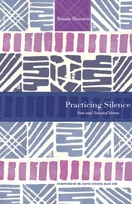 Practicing Silence: New and Selected Verses Bonnie Thurston (Paraclete Press) $19.99 I love paperbacks with the French folded covers, and find this handsome and attractive. Bonnie Thurston is known as an astute Bible scholar (having written several commentaries, and books on spirituality, including stuff on the early church fathers and mothers.) So it isn’t surprising, really, that her poetry has been used by Brother David Steindl-Rast who has a foreword) and the above-mentioned Brother Paul Quenon. This book really is about the spiritual life, perhaps an armchair visit to a monastery. Although it can be used devotionally, it is good art, carrying a rave review from (for instance) the Poet Laureate of Virginia (who calls it “pure and intense”) and a former Poet Laureate of Maryland and Emeritus professor who says “These poems are among the very best I have encountered in a lifetime of reading and teaching poetry.” Wow. Maybe that deserves an award, too, for Best. Blurb. Ever. Cheers!
Practicing Silence: New and Selected Verses Bonnie Thurston (Paraclete Press) $19.99 I love paperbacks with the French folded covers, and find this handsome and attractive. Bonnie Thurston is known as an astute Bible scholar (having written several commentaries, and books on spirituality, including stuff on the early church fathers and mothers.) So it isn’t surprising, really, that her poetry has been used by Brother David Steindl-Rast who has a foreword) and the above-mentioned Brother Paul Quenon. This book really is about the spiritual life, perhaps an armchair visit to a monastery. Although it can be used devotionally, it is good art, carrying a rave review from (for instance) the Poet Laureate of Virginia (who calls it “pure and intense”) and a former Poet Laureate of Maryland and Emeritus professor who says “These poems are among the very best I have encountered in a lifetime of reading and teaching poetry.” Wow. Maybe that deserves an award, too, for Best. Blurb. Ever. Cheers!
BEST BOOKS OF EASY-TO-READ CHRISTIAN DOCTRINE FOR ORDINARY FOLKS
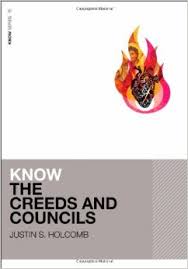
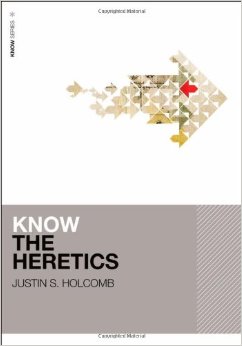 Know the Creeds and Councils Justin S. Holcomb (Zondervan) $12.99
Know the Creeds and Councils Justin S. Holcomb (Zondervan) $12.99
Know the Heretics Justin S. Holcomb (Zondervan) $12.99
Come on, people, you gotta love a set of books like this. They are compact-size, written with just a dash of whimsy (or at least it can be said that they aren’t dry.) Each one explains the historical background, the significance of the creeds or heresies, and why it matters today. The one on the Creeds is less needed, I suppose, as there are so many good books on this, although this is a really good re-telling. The one on the heresies, though, shows the dumb errors and considerable dangers, the orthodox responses, and suggests how these troubled ways of thinking about faith are still with us today. I applaud Holcomb for this sharp thinking, his pastoral concerns, and his decent way of “speaking the truth in love” as he kindly does what needs to be done, calling us to understand and stand in the great tradition of historic, orthodox Christian faith. Think this is too complicated? Get ’em, and see how fun it can be, learning this stuff. Think it is all too stuffy or you are too progressive to want to waste time with this? Please, give these a try, and see what you think. As they used to say in art school, you at least have to know the rules before you break ’em. This really is relevant, important material and we want to honor this great little attempt at bringing these historic matters to us in a readable way.
BEST BOOK OF PHILOSOPHY FOR ORDINARY PEOPLE
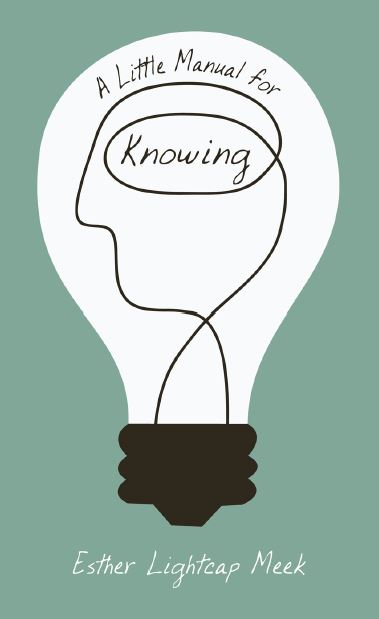 A Little Manual for Knowing Esther Lightcap Meek (Cascade) $14.00 This little book is just about 100 pages, and is — if I can use the fancy-pants scholarly word — about epistemology. What does it mean to really know? Steve Garber (in what I called the Book of the Year, Visions of Vocation) asks the huge question about what we do with what we know. But here, Dr. Meek goes a steep deeper: how do we know what we know. What does it even mean to really know something? She invited some pondering about this in the fantastic and interesting Longing to Know: The Philosophy of Knowing for Ordinary People and then did her major scholarly work on this in a thick tome called Loving to Know: Introducing Covenant Epistemology. This one is simple and clear and interesting. We know Esther, a professor at Geneva College, and we think the world of this. And we are not alone: lovely endorsements on the back are from the brilliant Gideon Strauss, the artist Makoto Fujimura (“essential reading for every university, every business, every church and every home”) psychologist Dan Allender (a “brilliant little manual.”) There is deep wisdom here, and you will be wiser if you read it, I am certain. Bruce Vojak (a dean of engineering at University of Illinois) writes, “with this pearl of great value, Esther Meek lovingly and confidentially shepherds us on a pilgrimage… for those who commit to the journey, the hoped-for gifts await.” The Best Little Manual of 2014!
A Little Manual for Knowing Esther Lightcap Meek (Cascade) $14.00 This little book is just about 100 pages, and is — if I can use the fancy-pants scholarly word — about epistemology. What does it mean to really know? Steve Garber (in what I called the Book of the Year, Visions of Vocation) asks the huge question about what we do with what we know. But here, Dr. Meek goes a steep deeper: how do we know what we know. What does it even mean to really know something? She invited some pondering about this in the fantastic and interesting Longing to Know: The Philosophy of Knowing for Ordinary People and then did her major scholarly work on this in a thick tome called Loving to Know: Introducing Covenant Epistemology. This one is simple and clear and interesting. We know Esther, a professor at Geneva College, and we think the world of this. And we are not alone: lovely endorsements on the back are from the brilliant Gideon Strauss, the artist Makoto Fujimura (“essential reading for every university, every business, every church and every home”) psychologist Dan Allender (a “brilliant little manual.”) There is deep wisdom here, and you will be wiser if you read it, I am certain. Bruce Vojak (a dean of engineering at University of Illinois) writes, “with this pearl of great value, Esther Meek lovingly and confidentially shepherds us on a pilgrimage… for those who commit to the journey, the hoped-for gifts await.” The Best Little Manual of 2014!
SPECIAL AWARD OF MERIT: MOST CONTROVERSIAL CHRISTIAN BOOK ON RACIAL JUSTICE — THAT MOST NEEDS TO BE CONSIDERED
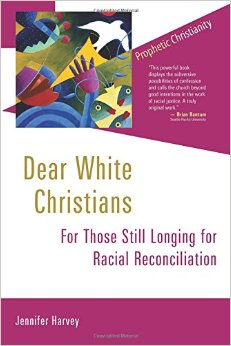 Dear White Christians: For Those Still Longing for Racial Reconciliation Jennifer Harvey (Eerdmans) $ 25.00 I’m not sure this is the best-written book of the year, as it is dense and uses some fairly serious specialty language. Ms Harvey is a religion professor and anti-racist activist; she will annoy many not just for heady sentences with cultural studies rhetoric about deconstructing the reigning paradigms but because, well, she deconstructs the reigning paradigms. Evangelical authors — many who are people of color and justice activists themselves — hold to a vision of racial reconciliation, and we have promoted many a book with this theme. Authentic, radically gospel-based reconciliation goes further and seems to me to be more Biblical, and demands harder work, then mere “appreciation” of diversity. (How hard this can be can be seen in reading the earnest and at time painful book More Than Equals by Chris Rice & Spencer Perkins, just for instance.) But this book, this goes further, insisting that the Bible calls us to deep justice, and that this demands repentance and — yes — reparations. You have got to read it.
Dear White Christians: For Those Still Longing for Racial Reconciliation Jennifer Harvey (Eerdmans) $ 25.00 I’m not sure this is the best-written book of the year, as it is dense and uses some fairly serious specialty language. Ms Harvey is a religion professor and anti-racist activist; she will annoy many not just for heady sentences with cultural studies rhetoric about deconstructing the reigning paradigms but because, well, she deconstructs the reigning paradigms. Evangelical authors — many who are people of color and justice activists themselves — hold to a vision of racial reconciliation, and we have promoted many a book with this theme. Authentic, radically gospel-based reconciliation goes further and seems to me to be more Biblical, and demands harder work, then mere “appreciation” of diversity. (How hard this can be can be seen in reading the earnest and at time painful book More Than Equals by Chris Rice & Spencer Perkins, just for instance.) But this book, this goes further, insisting that the Bible calls us to deep justice, and that this demands repentance and — yes — reparations. You have got to read it.
Reggie Williams (of the brilliant Bonhoeffer’s Black Jesus) says of it, “One of the most valuable contributions to the work of anti-racism in recent years. Harvey demonstrates with compelling accuracy and clarity why popular Christian dialogue about racial reconciliation does not work but in fact only serves to reinforce historic, systemic problems. As Lisa Sharon Harper (one of the authors of another book we honored this year, Forgive Us: Confessions of a Compromised Faith) and a trusted black friend says “Dear White Christians is a must-read. This kind of unflinching analysis is both rare and powerful.” Do we want to “repair our racialized society”? Does the “racial reconciliation” model work? Does it take us far enough? This is a book that moves the conversation in new ways and simply must be read, must be discussed, but be grappled with. Womanist Eboni Marshall Turman says it is “a timely and indispensable contribution to the field of Christian social ethics. This reparations paradigm is essential if we love the body of Christ and if we year for justice.”

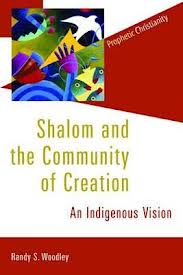
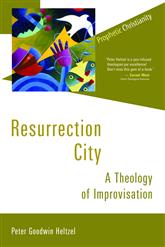
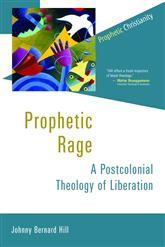 By the way, thanks and kudos to the Wm. B. Eerdmans Publishing Co. in Grand Rapids, Michigan, for doing this on-going, meaty and provocative set of books which they call the “prophetic Christianity” series. The senior editors are Bruce Ellis Benson, Malinda Elizabeth Berry and Peter Goodwin Heltzel.
By the way, thanks and kudos to the Wm. B. Eerdmans Publishing Co. in Grand Rapids, Michigan, for doing this on-going, meaty and provocative set of books which they call the “prophetic Christianity” series. The senior editors are Bruce Ellis Benson, Malinda Elizabeth Berry and Peter Goodwin Heltzel.
SPECIAL AWARD OF MERIT: ANOTHER BRILLIANT NEW BOOK BY PHILIP YANCEY
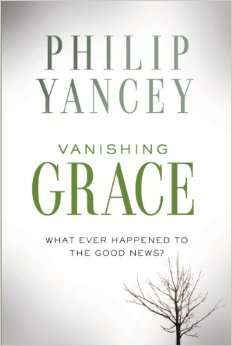 Vanishing Grace: What Ever Happened to the Good News? Philip Yancey (Zondervan) $22.99 Well, for starters, you have to love a book that shares an endorsement on the back by Max Lucado, one of the most popular, sweet, and I think altogether lovely evangelical wordsmith, and Bono, still one of the best rock stars in the history of rock and roll. (Bono, interestingly, seems to know Yancey, and writes “It is a lot to expect authors themselves to live up to the magic of their words, and it’s very special when they do. Philip Yancey has a way about him that can only be described as Graceful. Not vanishing, at all!”) There are three big things to say about this, after reminding you what an intelligent, open-minded, caring writer he is, known and read by our best writers. First, this book is in many ways a decades-later sequel to his landmark book What’s So Amazing About Grace which wondered why we seem not to be as graceful in our churches as our doctrine would lead us to be. It remains an excellent read and we highly recommend it, and this follow up is long-awaited, to be it mildly. (Perhaps it could earn an award for the longest-awaited sequel. Ha.) Secondly, this deserves attention because it does take seriously the latest research on the “nones” and the “spiritual but not religious” and those that David Kinnamen so importantly wrote about in You Lost Me. That is, why do people leave the church, and why are so many thoughtful people so very turned off? Fair or not, there is large animosity out there, and he is trying to think that through, and offer this concern about vanishing grace as part of the problem. Thirdly, we honor this remarkable book because of his interesting way in the core chapters, exploring the faith journeys of “pilgrims, activists and artists.” — people he calls “grace dispensers.” Well, he is one, and this book itself is a shot of love, a grace dispenser. He invites us to what he calls “holy subversion” and in a way that is elegant and clear, he offers compelling stories and keen observation. What a book!
Vanishing Grace: What Ever Happened to the Good News? Philip Yancey (Zondervan) $22.99 Well, for starters, you have to love a book that shares an endorsement on the back by Max Lucado, one of the most popular, sweet, and I think altogether lovely evangelical wordsmith, and Bono, still one of the best rock stars in the history of rock and roll. (Bono, interestingly, seems to know Yancey, and writes “It is a lot to expect authors themselves to live up to the magic of their words, and it’s very special when they do. Philip Yancey has a way about him that can only be described as Graceful. Not vanishing, at all!”) There are three big things to say about this, after reminding you what an intelligent, open-minded, caring writer he is, known and read by our best writers. First, this book is in many ways a decades-later sequel to his landmark book What’s So Amazing About Grace which wondered why we seem not to be as graceful in our churches as our doctrine would lead us to be. It remains an excellent read and we highly recommend it, and this follow up is long-awaited, to be it mildly. (Perhaps it could earn an award for the longest-awaited sequel. Ha.) Secondly, this deserves attention because it does take seriously the latest research on the “nones” and the “spiritual but not religious” and those that David Kinnamen so importantly wrote about in You Lost Me. That is, why do people leave the church, and why are so many thoughtful people so very turned off? Fair or not, there is large animosity out there, and he is trying to think that through, and offer this concern about vanishing grace as part of the problem. Thirdly, we honor this remarkable book because of his interesting way in the core chapters, exploring the faith journeys of “pilgrims, activists and artists.” — people he calls “grace dispensers.” Well, he is one, and this book itself is a shot of love, a grace dispenser. He invites us to what he calls “holy subversion” and in a way that is elegant and clear, he offers compelling stories and keen observation. What a book!
BEST BOOK OF CHRISTIAN CREATION-CARE / ENVIRONMENTAL STUDIES
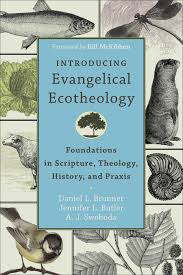 Introducing Evangelical Ecotheology: Foundations in Scripture, Theology, History and Praxis Daniel L. Brunner, Jennifer L. Butler, A. J. Swoboda (Baker Academic) $26.99 We have a very large selection of books about creation care, climate change, environmental stewardship and green living. Each year we preview bunches, and stock a good number. This, without a doubt, is the stand out volume of the year, certainly the best theological work on this topic in years. These authors are evangelicals, solid, passionate, and yet remarkably fluent with other faith traditions, and, of course, with the science of climate change, pollution and the like. This has rave reviews from Norman Wirzba, from Steven Bouma-Prediger, Leonard Sweet, and Rev. Flectcher Harper, the ecumenical director of GreenFaith. These scholars who are from George Fox University are exceptional, but, interestingly, they bring an interdisciplinary touch: Brunner is professor of Christian history and formation, Butler is a UCC pastor and instructor in earth-keeping, and A.J. is a professor of Biblical studies. (He, by the way, has edited an extraordinary volume of Pentecostal theologians and ethicists profoundly grappling with earth-keeping and environmental justice. Did you know the founder of Earth Day was a pacifist Pentecostal? More on Swoboda’s Blood Cries Out: Pentecostals, Ecology, and the Groans of Creation later.) For now, Introducing Evangelical Ecotheology deserves a very green award of merit. Cool they used the term ecotheology, too. Good for them!
Introducing Evangelical Ecotheology: Foundations in Scripture, Theology, History and Praxis Daniel L. Brunner, Jennifer L. Butler, A. J. Swoboda (Baker Academic) $26.99 We have a very large selection of books about creation care, climate change, environmental stewardship and green living. Each year we preview bunches, and stock a good number. This, without a doubt, is the stand out volume of the year, certainly the best theological work on this topic in years. These authors are evangelicals, solid, passionate, and yet remarkably fluent with other faith traditions, and, of course, with the science of climate change, pollution and the like. This has rave reviews from Norman Wirzba, from Steven Bouma-Prediger, Leonard Sweet, and Rev. Flectcher Harper, the ecumenical director of GreenFaith. These scholars who are from George Fox University are exceptional, but, interestingly, they bring an interdisciplinary touch: Brunner is professor of Christian history and formation, Butler is a UCC pastor and instructor in earth-keeping, and A.J. is a professor of Biblical studies. (He, by the way, has edited an extraordinary volume of Pentecostal theologians and ethicists profoundly grappling with earth-keeping and environmental justice. Did you know the founder of Earth Day was a pacifist Pentecostal? More on Swoboda’s Blood Cries Out: Pentecostals, Ecology, and the Groans of Creation later.) For now, Introducing Evangelical Ecotheology deserves a very green award of merit. Cool they used the term ecotheology, too. Good for them!
BEST THEOLOGICAL MEMOIR
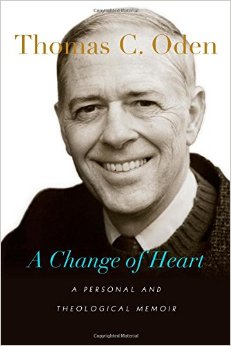 A Change of Heart: A Personal and Theological Memoir Thomas C. Oden (IVP Academic) $40.00 How to begin? Well, perhaps you’ve not read many theological autobiographies, and although this is rather plainly told with tons of details and fascinating stories, it is a valuable glimpse into not only the spiritual and theological journey of one brilliant scholar and writer, but it is, in many ways, a window into our times. Certainly, Oden was in the thick of and in many ways one of the creators of mid-20th century liberal theology, and was active in the fascinating best years of the World Council of Churches. But — and I would say, thanks be to God — he saw the way in which shoddy and trendy liberalized theology and ideological political activism was secularizing mainline Protestantism, and he shifted, and he shifted hard. He discovered the early church fathers, and increasingly became a scholar of their pastoral visions. He has been a voice among mainline folks (he taught at Drew) calling for a sensible return to the first things of the gospel, and he has been also a voice among evangelicals to dig more deeply into early church sources, the work of those early thinkers and pastors who set the stage for historic, creedal faith. (Oden is the general editor of the Ancient Christian Commentary on the Scripture and the Ancient Christian Doctrine series, both published by IVP Academic) and now is the Director of the Center for Early African Christianity at Eastern University. His impact, in various quarters, in different ways, throughout his illustrious life, is hard to underestimate.
A Change of Heart: A Personal and Theological Memoir Thomas C. Oden (IVP Academic) $40.00 How to begin? Well, perhaps you’ve not read many theological autobiographies, and although this is rather plainly told with tons of details and fascinating stories, it is a valuable glimpse into not only the spiritual and theological journey of one brilliant scholar and writer, but it is, in many ways, a window into our times. Certainly, Oden was in the thick of and in many ways one of the creators of mid-20th century liberal theology, and was active in the fascinating best years of the World Council of Churches. But — and I would say, thanks be to God — he saw the way in which shoddy and trendy liberalized theology and ideological political activism was secularizing mainline Protestantism, and he shifted, and he shifted hard. He discovered the early church fathers, and increasingly became a scholar of their pastoral visions. He has been a voice among mainline folks (he taught at Drew) calling for a sensible return to the first things of the gospel, and he has been also a voice among evangelicals to dig more deeply into early church sources, the work of those early thinkers and pastors who set the stage for historic, creedal faith. (Oden is the general editor of the Ancient Christian Commentary on the Scripture and the Ancient Christian Doctrine series, both published by IVP Academic) and now is the Director of the Center for Early African Christianity at Eastern University. His impact, in various quarters, in different ways, throughout his illustrious life, is hard to underestimate.
Timothy George of Beeson Divinity School says bluntly that “Tom Oden is one of the most remarkable Christians of our time. This is the story of how he has lived through, contributed to and helped overthrow several revolutions during his long and fruitful life.”
Roberta Green Ahmanson, an exceptionally generous art patron and cultural renewal leader and writer herself, says “In a century when intellectuals abandoned the Christian faith in droves, one intellectual had the courage to embrace it. A movement liberal at forty, at eighty Tom Oden had become the champion of the classic Christian consensus. A Change of Heart tells the story of one of the twentieth century’s most courageous intellectual and spiritual journeys.”
I like the advice of Lamin Sanneh of Yale Divinity School: “Oden’s view that theology should not be at the whim of every passing fashion, or that current affairs should not be the litmus test, deserves careful consideration every by those who disagree with him.”
We honor him and this provocative book. It may be counter-intuitive, but I think I will say it is boldly radical. His change of heart, his change in direction, his call to be ancient, moving forward by, in a sense, appropriating the past, is a pretty daring move. Read all about it in this fine autobiography.
HONORABLE MENTIONS FOR ACADEMIC THEOLOGY TEXT
Again, here I am way out of my expertise, and our ecumenically diverse inventory means we’ve got all kinds of stuff, from all kinds of views, on all kinds of themes and sub-themes. I think that these two, though, seem to fit my end of the year honorable mentions list.
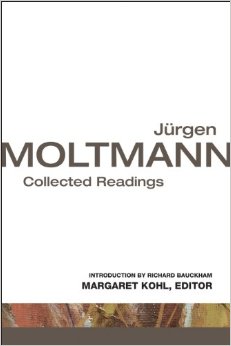 Jurgen Moltmann: Collected Readings edited by Margaret Kohl (Fortress) $34.00 Fortress’s slogan these days is “scholarship that matters” and here, at least, they are surely right. Moltmann is a bone fide major league world class theologian. I heard him years ago, and realized then that he was over my head, and that his concerns were vital, important, prescient, even. Here, Kohl has given us an essential reader, collecting many of his groundbreaking writings together in one good volume. The very reliable Richard Bauckham does the significant introduction. Kudos to Fortress not only for this very valuable volume, but for others in this series, such as one published last year by John Douglas Hall.
Jurgen Moltmann: Collected Readings edited by Margaret Kohl (Fortress) $34.00 Fortress’s slogan these days is “scholarship that matters” and here, at least, they are surely right. Moltmann is a bone fide major league world class theologian. I heard him years ago, and realized then that he was over my head, and that his concerns were vital, important, prescient, even. Here, Kohl has given us an essential reader, collecting many of his groundbreaking writings together in one good volume. The very reliable Richard Bauckham does the significant introduction. Kudos to Fortress not only for this very valuable volume, but for others in this series, such as one published last year by John Douglas Hall.
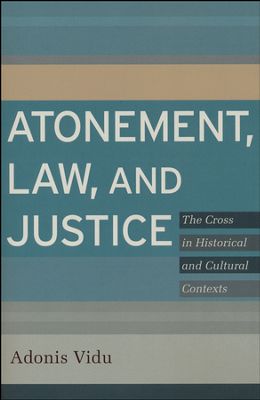 Atonement, Law, and Justice: The Cross in Historical and Cultural Context Adonis Vidu (Baker Academic) $24.99 Anyone who follows contemporary theology knows that debates rage about the nature of the cross, about atonement theories and the like. I find some of this troubling, but much of it is wholesome and helpful. I do not think that Dr. Adonis Vidu (of Gordon Conwell Theological Seminary) has resolved all the important questions surround this profound mystery — the nature of the atoning work of the cross — but what he does here is very, very valuable and I want to honor it by bestowing our little award. This sophisticated book really does make a helpful contribution by showing how various schools of thought and theories and theologies were rooted in certain historical and cultural settings. These cultural settings helped shape how thinkers in those times and places viewed matters of the law, what legalities were. Without much effort we can see that assumptions about the nature of law and penalties and punishment and justice are themselves informed by culture and somewhat constructed, so when we import those views of law and justice into the theological conversations we are adopting definitions and assumptions about what is going on and through the cross. Impressive, rigorous Reformed scholars such as Carl Trueman have given Atonement, Law, and Justice good reviews; Hans Boersma of Regent (and author of the important Violence, Hospitality and the Cross) offers a favorable assessment, too. I want to underscore these scholars who say this will repay careful study. I want to say it is important that we do. Kudos.
Atonement, Law, and Justice: The Cross in Historical and Cultural Context Adonis Vidu (Baker Academic) $24.99 Anyone who follows contemporary theology knows that debates rage about the nature of the cross, about atonement theories and the like. I find some of this troubling, but much of it is wholesome and helpful. I do not think that Dr. Adonis Vidu (of Gordon Conwell Theological Seminary) has resolved all the important questions surround this profound mystery — the nature of the atoning work of the cross — but what he does here is very, very valuable and I want to honor it by bestowing our little award. This sophisticated book really does make a helpful contribution by showing how various schools of thought and theories and theologies were rooted in certain historical and cultural settings. These cultural settings helped shape how thinkers in those times and places viewed matters of the law, what legalities were. Without much effort we can see that assumptions about the nature of law and penalties and punishment and justice are themselves informed by culture and somewhat constructed, so when we import those views of law and justice into the theological conversations we are adopting definitions and assumptions about what is going on and through the cross. Impressive, rigorous Reformed scholars such as Carl Trueman have given Atonement, Law, and Justice good reviews; Hans Boersma of Regent (and author of the important Violence, Hospitality and the Cross) offers a favorable assessment, too. I want to underscore these scholars who say this will repay careful study. I want to say it is important that we do. Kudos.
BEST BOOK OF CHRISTIAN HISTORY — AND MORE
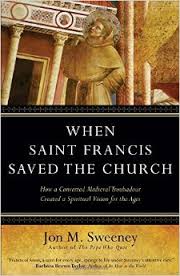 When Saint Francis Saved the Church: How a Converted Medieval Troubadour Created a Spiritual Vision for the Ages Jon M. Sweeney (Ave Maria Press) $22.00 Who isn’t intrigued by the latest Pope, named Saint Francis? And who isn’t interested in the legendary medieval servant of the poor, peacemaker, mystic? You know, the one from Assisi. Maybe you have read a few books about Francis and Clare, or maybe you’ve been touched by his famous peace prayer. Now is the time to learn more, and Jon Sweeney, who has written widely on Francis, is your perfect guide. This is a fabulously interesting book, well written, and should be loudly celebrated — how did they do that in the Middle Ages, anyway, with a boars-head feaste or something? Jon deserves it. This book deserves it.
When Saint Francis Saved the Church: How a Converted Medieval Troubadour Created a Spiritual Vision for the Ages Jon M. Sweeney (Ave Maria Press) $22.00 Who isn’t intrigued by the latest Pope, named Saint Francis? And who isn’t interested in the legendary medieval servant of the poor, peacemaker, mystic? You know, the one from Assisi. Maybe you have read a few books about Francis and Clare, or maybe you’ve been touched by his famous peace prayer. Now is the time to learn more, and Jon Sweeney, who has written widely on Francis, is your perfect guide. This is a fabulously interesting book, well written, and should be loudly celebrated — how did they do that in the Middle Ages, anyway, with a boars-head feaste or something? Jon deserves it. This book deserves it.
The eloquent Barbara Brown Taylor doesn’t blurb that many books, but she is positive about this one. She writes, “Jon Sweeney is good at many things, but he is a master at retrieving the treasure of the Christian past and restoring it to currency for the Christian present. In this book, he transcends even those categories.” (She also says that Francis of Assisi “springs to life” under Sweeney’s care.) One of our most popular spiritual writers of the last decade, Richard Rohr, is himself a Franciscan, and he says this is “an exciting, intelligent, and faithful understanding of Francis of Assis — for our time and for all time! Read and find hope!”
I was drawn to this book because I know of Sweeney’s acclaim as an editor and writer, but was particularly struck by this back-cover blurb by Bert Ghezzi (author of Voices of the Saints) who wrote that “Reflecting with Jon Sweeney on the work and wisdom of St. Francis of Assisi orients us on how to pray for Pope Francis’s effort and to respond to his initiatives.” That certainly is a brilliant way to think about reading a book — that it will make us attentive to a world Christian leader, and help us pray and respond in faithfulness. That makes this not only a great book to enjoy and to learn from, but may make it nearly essential. We are happy to honor it, adding it to our list of Best Books of 2014.
BEST BOOK ON PREACHING
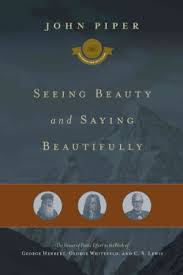 Seeing Beauty and Saying Beautifully: The Power of Poetic Effect in the Work of George Herbert, George Whitfield and C.S. Lewis John Piper (Crossway) $19.99 I’m a bit out on the proverbial limb here, since this may not, technically speaking, even be a book on homiletics. We’ve gotten some great ones in this year — from Giving Blood by Leonard Sweet which blew me away to the creatively titled Invasion of the Dead: Preaching Resurrection by Brian Blount, and a new one by a great wordsmith and solid Dutch preacher, Scott Hoezee. But this grabbed me, and I need to honor it appropriately. Piper is a passionate and eloquent, if not always elegant, writer and Baptist preacher. He has done a series of book wherein he offers three short biographies in each, biographies of the “swans who are not silent” (an allusion to a line said by the successor to the great preacher in 425 AD, Saint Augustine.) In these “The Swans Are Not Silent” series, Piper draws from past leaders some particular truth — one is on suffering, one on endurance, one on the sovereignty of God. This new one, that looks at Herbert, Whitefield and Lewis, looks at the relationship of believing in the beauty of God and speaking beautifully. How might our deep theological aesthetic shape the poetics of our speech? What is the relationship between truth and beauty? By telling us how the poet, the preacher, and the novelist did this, we can be inspired to “see beauty” and “say it beautifully.” Preachers, at least, should ponder this. This is a moving little book, and like the others, it is inspiring to see how Piper draws on themes of these past swans, eloquent leaders of the historic faith.
Seeing Beauty and Saying Beautifully: The Power of Poetic Effect in the Work of George Herbert, George Whitfield and C.S. Lewis John Piper (Crossway) $19.99 I’m a bit out on the proverbial limb here, since this may not, technically speaking, even be a book on homiletics. We’ve gotten some great ones in this year — from Giving Blood by Leonard Sweet which blew me away to the creatively titled Invasion of the Dead: Preaching Resurrection by Brian Blount, and a new one by a great wordsmith and solid Dutch preacher, Scott Hoezee. But this grabbed me, and I need to honor it appropriately. Piper is a passionate and eloquent, if not always elegant, writer and Baptist preacher. He has done a series of book wherein he offers three short biographies in each, biographies of the “swans who are not silent” (an allusion to a line said by the successor to the great preacher in 425 AD, Saint Augustine.) In these “The Swans Are Not Silent” series, Piper draws from past leaders some particular truth — one is on suffering, one on endurance, one on the sovereignty of God. This new one, that looks at Herbert, Whitefield and Lewis, looks at the relationship of believing in the beauty of God and speaking beautifully. How might our deep theological aesthetic shape the poetics of our speech? What is the relationship between truth and beauty? By telling us how the poet, the preacher, and the novelist did this, we can be inspired to “see beauty” and “say it beautifully.” Preachers, at least, should ponder this. This is a moving little book, and like the others, it is inspiring to see how Piper draws on themes of these past swans, eloquent leaders of the historic faith.
BEST SHORT BOOK ON THE CHRISTIAN MIND
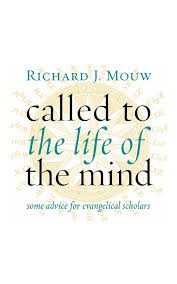 Called to the Life of the Mind: Some Advice for Evangelical Scholars Richard J. Mouw (Eerdmans) $10.00 It is always a good year if a new Rich Mouw book is released. This is him in his popular short form, and these essays are almost too short. Brief, succinct, almost devotional, this is advice, reflection, rumination, and story-telling about the calling of the Christian scholar. Jamie Smith writes, “Too many Christian responses to anti-intellectualism end up endorsing what Augustine calls curiositas — the pursuit of knowledge for knowledge’s sake. This marvelous little book from one of my heros, Rich Mouw, is a distinct call for the faithful cultivation of the mind in service of Christ.” Messiah College’s Richard Hughes says it is “a gem of a book” and Mark Noll and J.I. Packer weigh in. We have to shout out this one — three very big cheers for this very small book.
Called to the Life of the Mind: Some Advice for Evangelical Scholars Richard J. Mouw (Eerdmans) $10.00 It is always a good year if a new Rich Mouw book is released. This is him in his popular short form, and these essays are almost too short. Brief, succinct, almost devotional, this is advice, reflection, rumination, and story-telling about the calling of the Christian scholar. Jamie Smith writes, “Too many Christian responses to anti-intellectualism end up endorsing what Augustine calls curiositas — the pursuit of knowledge for knowledge’s sake. This marvelous little book from one of my heros, Rich Mouw, is a distinct call for the faithful cultivation of the mind in service of Christ.” Messiah College’s Richard Hughes says it is “a gem of a book” and Mark Noll and J.I. Packer weigh in. We have to shout out this one — three very big cheers for this very small book.
Here is a nice little video advertisement for the book. Enjoy!
BEST BIG BOOK ON THE CHRISTIAN MIND
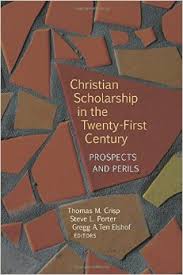 Christian Scholarship in the Twenty-First Century: Prospects and Perils edited by Thomas M. Crisp, Steve L. Porter, Gregg A. Ten Elshof (Eerdmans) $27.00 The perennial questions of what, really, is Christian scholarship and what is the calling of a Christian scholar, and how Christian scholars can engage their disciplines in a distinctly Christian way are the pressing matters of this academic collection from the Biola University Center for Christian Thought. I don’t know if every chapter here is the best single piece published this year, but, taken together, this conversation — this fabulous anthology by Christian academics, about rigorous and faithful work in higher education — is certainly well worth celebrating. With authors like Paul Moser and Natasha Duqette and Alvin Plantinga and Nicholas Wolterstorff and Amos Young, this is diverse, thoughtful, and a significant contribution to those asking big questions about the rich tradition of faith and how it applies to the broader cultural questions, especially those asked in the arts and sciences. From the habits and commitments of the scholar to the methodology and pedagogy questions, this is a spirited (and Spirited!) volume
Christian Scholarship in the Twenty-First Century: Prospects and Perils edited by Thomas M. Crisp, Steve L. Porter, Gregg A. Ten Elshof (Eerdmans) $27.00 The perennial questions of what, really, is Christian scholarship and what is the calling of a Christian scholar, and how Christian scholars can engage their disciplines in a distinctly Christian way are the pressing matters of this academic collection from the Biola University Center for Christian Thought. I don’t know if every chapter here is the best single piece published this year, but, taken together, this conversation — this fabulous anthology by Christian academics, about rigorous and faithful work in higher education — is certainly well worth celebrating. With authors like Paul Moser and Natasha Duqette and Alvin Plantinga and Nicholas Wolterstorff and Amos Young, this is diverse, thoughtful, and a significant contribution to those asking big questions about the rich tradition of faith and how it applies to the broader cultural questions, especially those asked in the arts and sciences. From the habits and commitments of the scholar to the methodology and pedagogy questions, this is a spirited (and Spirited!) volume
HONORABLE MENTION: A REMARKABLE BOOK OFFERING A GLIMPSE INTO CHRISTIAN HIGHER EDUCATION
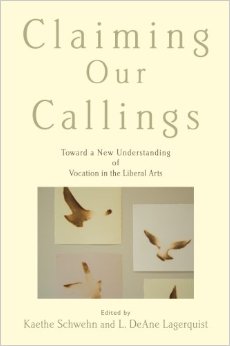 Claiming Our Callings: Toward a New Understanding of Vocation in the Liberal Arts edited by Kaethe Schwehn and L. DeAne Lagerquist (Oxford University Press) $27.95 What a great idea — telling the story of how the notions of calling and vocation have informed the way one Lutheran college has worked, and how the staff their have integrated this rich, multi-layered notion into their work in higher education.
Claiming Our Callings: Toward a New Understanding of Vocation in the Liberal Arts edited by Kaethe Schwehn and L. DeAne Lagerquist (Oxford University Press) $27.95 What a great idea — telling the story of how the notions of calling and vocation have informed the way one Lutheran college has worked, and how the staff their have integrated this rich, multi-layered notion into their work in higher education.
I love the foreword by Doug Jacobsen and Rhonda Hustedt Jacobsen who write that,
Claiming Our Callings is recommended reading for anyone interested in the future of American higher education, whether that education takes place at a church-related institutions or a public university or someplace else… it does not tell colleges and universities what they should do; it does not pontificate about what ought to be. Instead, and much more valuably, it paints a picture of how one particular institution educates students in a manner that inspires reflections on what could be done or might be appropriate. There is no one model of learning and life that applies to all institutions of higher learning, but this record of St. Olaf’s experiences opens an important doorway of imagination for what might be possible elsewhere.
Schwehn got her MFA from the famous Iowa Writer’s Workshop and Lagerquist holds at PhD from the University of Chicago Divinity School, and both are on faculty at St. Olaf’s and are leaders in both the Lily Fellows Network of church-related colleges and within Lutheran higher education. This book is a great read, full of remarkable insight, and an exciting “doorway of imagination.” Congratulations to all — this is a worthy, beautiful, rich book.
THE BEST NEW WALTER BRUEGGEMANN
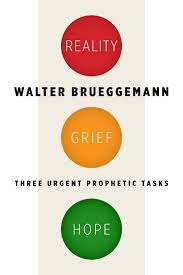 Reality Grief Hope: Three Urgent Prophetic Tasks Walter Brueggemann (Eerdmans) $15.00 I want to say this briefly, so I will cut to the chase. Brueggemann’s Prophetic Imagination is one of the most important religious books of the 20th century, and that, coupled with The Hopeful Imagination changed my views, gave voice to my inclinations, and gave me categories and vocabulary that I have employed ever since. It is widely esteemed, and this, my friends, is the closest thing to a sequel of The Prophetic Imagination then anything he has yet done. This, as Brian McLaren has said of it, “takes us from the world of the Bible to the headlines of today, opening inconvenient but desperately needed truths.” Hauerwas is right, too, “It is one thing to call for a prophetic imagination; it is quite another matter to actually have a prophetic imagination.” This is a fully amazing book, a good entry point if you haven’t read Brueggemann before or lately. It is doubtlessly one of the most important books of the year, and insofar as it draws us to his other work, too, one of the important books of his career. Don’t
Reality Grief Hope: Three Urgent Prophetic Tasks Walter Brueggemann (Eerdmans) $15.00 I want to say this briefly, so I will cut to the chase. Brueggemann’s Prophetic Imagination is one of the most important religious books of the 20th century, and that, coupled with The Hopeful Imagination changed my views, gave voice to my inclinations, and gave me categories and vocabulary that I have employed ever since. It is widely esteemed, and this, my friends, is the closest thing to a sequel of The Prophetic Imagination then anything he has yet done. This, as Brian McLaren has said of it, “takes us from the world of the Bible to the headlines of today, opening inconvenient but desperately needed truths.” Hauerwas is right, too, “It is one thing to call for a prophetic imagination; it is quite another matter to actually have a prophetic imagination.” This is a fully amazing book, a good entry point if you haven’t read Brueggemann before or lately. It is doubtlessly one of the most important books of the year, and insofar as it draws us to his other work, too, one of the important books of his career. Don’t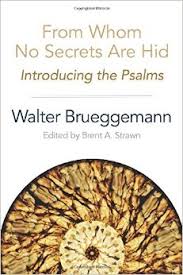 miss it.
miss it.
By the way, Brueggemann published a 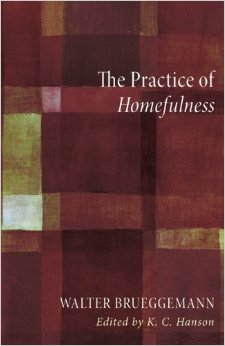 significant paperback text on the Psalms this fall — From Whom No Secrets Are Hid: Introducing the Psalms (Westminster/John Knox; $30.00) the first major look at the Psalms he has done in quite a while. And special kudos to Wipf & Stock for releasing handsome, smallish paperback collections in uniform covers of Walt’s papers, sermons, speeches. New this past Spring was one that ought to be awarded something — best title, perhaps? — allusively called The Practice of Homefulness (Wipf & Stock; $17.00) Nice, huh? For all of his generative, bold, work, we give thanks to the Lord.
significant paperback text on the Psalms this fall — From Whom No Secrets Are Hid: Introducing the Psalms (Westminster/John Knox; $30.00) the first major look at the Psalms he has done in quite a while. And special kudos to Wipf & Stock for releasing handsome, smallish paperback collections in uniform covers of Walt’s papers, sermons, speeches. New this past Spring was one that ought to be awarded something — best title, perhaps? — allusively called The Practice of Homefulness (Wipf & Stock; $17.00) Nice, huh? For all of his generative, bold, work, we give thanks to the Lord.
BEST BOOK ABOUT HOMOSEXUALITY AND THE CHURCH
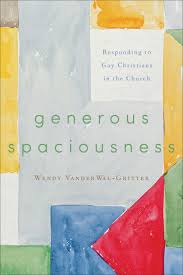 Generous Spaciousness: Responding to Gay Christians in the Church Wendy Vander Wall-Gritter (Brazos Press) $16.99 This has been a year during which many books have been released assessing, re-assessing (and countering the reassessing) the church’s view(s) of GLBT members, same sex marriage policies, etcetera, etcetera. There is hardly a topic where our commitment to carry various views and many books on these perspectives is less appreciated — “something to offend everyone” we sometimes joke. But this is nothing to joke about, as the pain is deep, the theological concerns profound, and the torn fabric of our denominations tragic. We could highlight many books that I read on this topic this year (and I have read a goodly number) but I want to award just one, and it is without a doubt this extraordinary work. VanderWal-Gritter has been executive director of new (“ex-gay”) Direction Ministry in Canada; in fact, she was instrumental in
Generous Spaciousness: Responding to Gay Christians in the Church Wendy Vander Wall-Gritter (Brazos Press) $16.99 This has been a year during which many books have been released assessing, re-assessing (and countering the reassessing) the church’s view(s) of GLBT members, same sex marriage policies, etcetera, etcetera. There is hardly a topic where our commitment to carry various views and many books on these perspectives is less appreciated — “something to offend everyone” we sometimes joke. But this is nothing to joke about, as the pain is deep, the theological concerns profound, and the torn fabric of our denominations tragic. We could highlight many books that I read on this topic this year (and I have read a goodly number) but I want to award just one, and it is without a doubt this extraordinary work. VanderWal-Gritter has been executive director of new (“ex-gay”) Direction Ministry in Canada; in fact, she was instrumental in
helping her colleagues at Exodus International admit that their
“reparative therapy” work was less successful then they admitted, causing this national ex-gay ministry to disband. She is known as a fair and kind advocate for good discussion, and has worked well with many “sides” in this complicated matter. Generous Spaciousness, as you can imagine from the title, is decidedly not about getting to the “right” answer on the Biblical or theological question, but about learning to talk about it decently, with care and grace and integrity and how to treat those who are often painfully excluded from the church’s fellowship. This book is about how the church simply must be a community of honest and safe conversations, where our deepest differences can be worked through. As Gary Nelson (Borderland Churches) says, “You will not agree with everything Wendy says no matter where you position yourself in the conversation, but you will be stretched.” That is the sign of a good book, eh?
Brian Walsh writes, “I can’t imagine a more timely book. Modeling the very “generous spaciousness” that she advocates, VanderWal-Gritter’s heart is on every page. The church is at a crucial moment of transition in relation to gay brothers and sisters, and this wonderfully written book will prove to be one of the most helpful guides in the midst of the change. Profoundly and deeply biblical, theologically rich, and rooted in years of humble, respectful, and vulnerable listening, VanderWal-Gritter’s wisdom is precisely what we so desperately need.” One of the very best books I’ve read all year, good for for thinking about sexual ethics, good for thinking about how to get alone as the people of God in these times. Here is one good review of Wendy VanderWal’s book, from the other side of the pond which is fair and honest and mostly favorable. Here is a very critical review by a guy I respect that thinks she is not as fair or orthodox as she ought to be. Here is a good review by a gay, celibate couple which is illuminating. Agree with her view of God, her exegesis of Scripture, or her open-minded, open-hearted approach to community and inclusion, this is, still, simply a must-read. We’re happy to honor it.
AWARD OF MERIT FOR BEST OLD BOOK NEWLY TRANSLATED
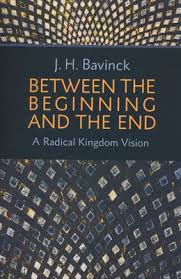 Between the Beginning and the End: A Radical Kingdom Vision J. H. Bavinck (Eerdmans) $20.00 Many in both the conservative Calvinist movement and others who are interested in an orthodox theology that can fund sustained cultural engagement are reading Herman Bavinck. This is a good thing, and a long time coming. This Bavinck also deserves a come-back, and this is the second volume of the great Dutch missiologist (1895 – 1964) published by Eerdmans in as many years. John Bolt writes of Between the Beginning and the End, “I don’t know of another single book that provides such a reliable and inspiring guide to the panorama of biblical salvation history and its immediacy for us.” The world-class Andrew Walls (who splits his time between Liverpool and Ghana) says it is “immense in scope and range, rich in suggestion and allusion… splendid and thought-provoking.” Charles Van Engen of Fuller says “This moving meditation is a must-read for all church leaders. Bavinck’s radical kingdom vision will revolutionize the reader’s understanding of the Christ’s place and role in God’s mission from age to age. Bert Hielema’s translation is outstanding –readable, fluid, clear, forceful, and compelling.” Be thankful that publishers do this kind of work, bringing older works to the light of day. Kudos all around.
Between the Beginning and the End: A Radical Kingdom Vision J. H. Bavinck (Eerdmans) $20.00 Many in both the conservative Calvinist movement and others who are interested in an orthodox theology that can fund sustained cultural engagement are reading Herman Bavinck. This is a good thing, and a long time coming. This Bavinck also deserves a come-back, and this is the second volume of the great Dutch missiologist (1895 – 1964) published by Eerdmans in as many years. John Bolt writes of Between the Beginning and the End, “I don’t know of another single book that provides such a reliable and inspiring guide to the panorama of biblical salvation history and its immediacy for us.” The world-class Andrew Walls (who splits his time between Liverpool and Ghana) says it is “immense in scope and range, rich in suggestion and allusion… splendid and thought-provoking.” Charles Van Engen of Fuller says “This moving meditation is a must-read for all church leaders. Bavinck’s radical kingdom vision will revolutionize the reader’s understanding of the Christ’s place and role in God’s mission from age to age. Bert Hielema’s translation is outstanding –readable, fluid, clear, forceful, and compelling.” Be thankful that publishers do this kind of work, bringing older works to the light of day. Kudos all around.
AWARD OF MERIT FOR — WELL, FOR BEING SO DARN INTERESTING, DARING, RARE
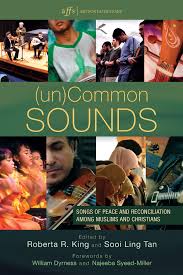 (Un)Common Sounds: Songs of Peace and Reconciliation Among Muslims and Christians edited by Roberta R. King and Sooi Ling Tan (Cascade) $38.00 What a truly fascinating, rare, stimulating and inspiring book, and how good to know that there are people doing this kind of artful mission work — peacemaking through music! — and writing about it with such academic rigor. And a touch of bon vivant. King and Tan teach at the most multi-ethnic seminary in the country, the evangelically-minded Fuller Theological Seminary. (Dr. King teaches Communication and Ethnomusicology and Dr. Tan also teaches at Malaysia Baptist Theological Seminary.) The essays collected here tell the story of peacemaking efforts experienced throughout the world by bringing together Christians and Muslims to learn indigenous music, to play each others instruments, to sing and worship and play together. Can music and the performing arts aid peacebuilding and interfaith dialogue? This splendid book is based on research in the Middle East, North Africa, and Indonesia and shares specific case studies. It includes discussion questions and even projects for each chapter so it may be used as a textbook or experiential adult education study. There are good forewords here, too, by William Dyrness and Najeeba Syeed-Miller. This is a rigorous, interfaith project and a sophisticated book. We are happy to honor it, hoping, as the authors suggest, that as we learn each others songs and watch each others shows, the “un” can be removed, and we will have “common sounds.” Please, Lord. Please enjoy the fabulously beautiful Songs for Peace Project website, here. There has been a documentary film made about this, too.
(Un)Common Sounds: Songs of Peace and Reconciliation Among Muslims and Christians edited by Roberta R. King and Sooi Ling Tan (Cascade) $38.00 What a truly fascinating, rare, stimulating and inspiring book, and how good to know that there are people doing this kind of artful mission work — peacemaking through music! — and writing about it with such academic rigor. And a touch of bon vivant. King and Tan teach at the most multi-ethnic seminary in the country, the evangelically-minded Fuller Theological Seminary. (Dr. King teaches Communication and Ethnomusicology and Dr. Tan also teaches at Malaysia Baptist Theological Seminary.) The essays collected here tell the story of peacemaking efforts experienced throughout the world by bringing together Christians and Muslims to learn indigenous music, to play each others instruments, to sing and worship and play together. Can music and the performing arts aid peacebuilding and interfaith dialogue? This splendid book is based on research in the Middle East, North Africa, and Indonesia and shares specific case studies. It includes discussion questions and even projects for each chapter so it may be used as a textbook or experiential adult education study. There are good forewords here, too, by William Dyrness and Najeeba Syeed-Miller. This is a rigorous, interfaith project and a sophisticated book. We are happy to honor it, hoping, as the authors suggest, that as we learn each others songs and watch each others shows, the “un” can be removed, and we will have “common sounds.” Please, Lord. Please enjoy the fabulously beautiful Songs for Peace Project website, here. There has been a documentary film made about this, too.
BEST DAILY DEVOTIONAL
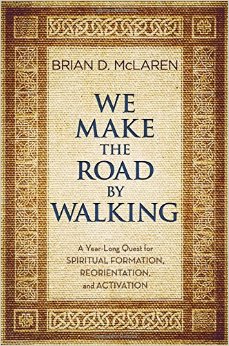 We Make the Road by Walking: A Year-Long Quest for Spiritual Formation, Reorientation, and Activation Brian D. McLaren (Jericho) $25.00 I know there are many wonderful daily devotionals of a fairly conventional sort, and we stock plenty. Any one may change your life as you take up the habit of reading just a bit each day, reading the prayer, pondering the passage. But this, this is a bit larger in scope: it is a year long study, to be done hopefully with others, which tells the Bible story in almost paraphrased, colorful novelization. Brian is a creative Bible teacher and explains much about what is happening as he walks us through, day by day, week by week, each portion of the Bible story. It is a journey one undertakes, a journey to submit oneself to this big narrative, to find ourselves drawn to Christ and his work in the work, and to apply it to our own orientation to the world and its great needs. Dare we believe this old old story makes a difference in postmodern 21st century? Can this story form us, give us hope, push us towards what some might call a Christianly understood progressive social agenda? One reviewer says this is “a sinewy, but orderly and open presentation of the faith. The result is as startling as it is beautify” It a book of this nature one will surely wish for this Biblical text to be explore or that theological truth to be unpacked or one or another cause or concern to be brought into the mix. It is remarkable how much is included in this informal lectionary and daily reading guide. Do you want to follow Christ with more common sense and yet vibrant daily discipleship? Do you wish to know the Bible better, without being too wooden or literalistic? Do you want to have your story be shaped by the big Story? This is one of the most interesting guidebooks we’ve seen, and want to honor it well, one of the best of the year.
We Make the Road by Walking: A Year-Long Quest for Spiritual Formation, Reorientation, and Activation Brian D. McLaren (Jericho) $25.00 I know there are many wonderful daily devotionals of a fairly conventional sort, and we stock plenty. Any one may change your life as you take up the habit of reading just a bit each day, reading the prayer, pondering the passage. But this, this is a bit larger in scope: it is a year long study, to be done hopefully with others, which tells the Bible story in almost paraphrased, colorful novelization. Brian is a creative Bible teacher and explains much about what is happening as he walks us through, day by day, week by week, each portion of the Bible story. It is a journey one undertakes, a journey to submit oneself to this big narrative, to find ourselves drawn to Christ and his work in the work, and to apply it to our own orientation to the world and its great needs. Dare we believe this old old story makes a difference in postmodern 21st century? Can this story form us, give us hope, push us towards what some might call a Christianly understood progressive social agenda? One reviewer says this is “a sinewy, but orderly and open presentation of the faith. The result is as startling as it is beautify” It a book of this nature one will surely wish for this Biblical text to be explore or that theological truth to be unpacked or one or another cause or concern to be brought into the mix. It is remarkable how much is included in this informal lectionary and daily reading guide. Do you want to follow Christ with more common sense and yet vibrant daily discipleship? Do you wish to know the Bible better, without being too wooden or literalistic? Do you want to have your story be shaped by the big Story? This is one of the most interesting guidebooks we’ve seen, and want to honor it well, one of the best of the year.
BEST LIVE BIBLE STUDY — A RESOURCE AND A REPORT FROM THE FIELD
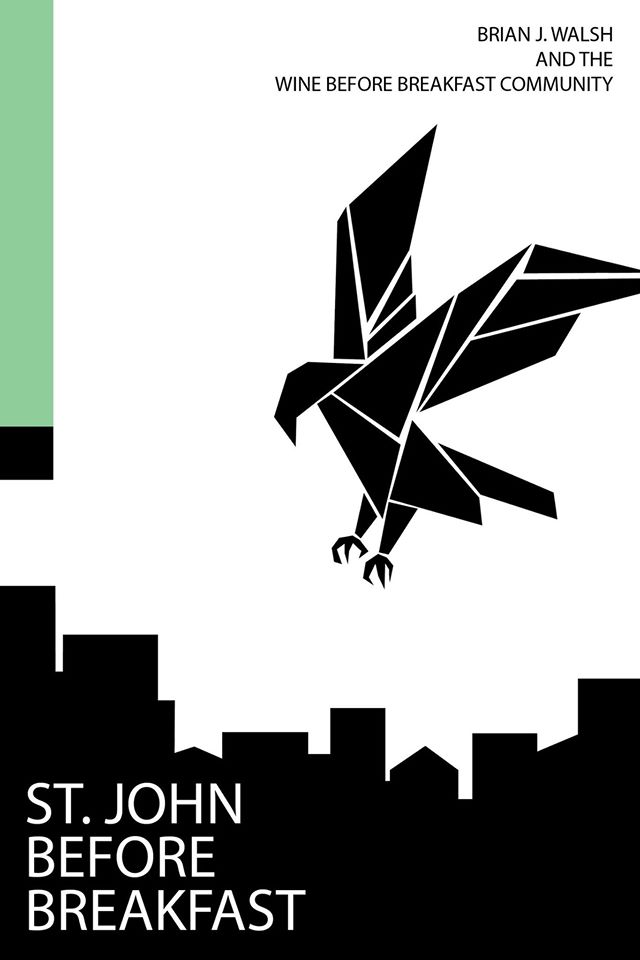 St John Before Breakfast Brian J. Walsh and the Wine Before Breakfast Community (Books Before Breakfast) $18.00 I want to honor this feisty book with two awards, naming it the best “live” Bible study book, a resource that are transcripts of real studies done live, so to speak, and that you yourself could use, and, also, as the best report back from the fields of faithful ministry, a glimpse into an innovative and lively work among college students at the University of Toronto. This little gathered community meets for a communion service early morning each week — Wine Before Breakfast, you see — and with the leadership of Brian (and others) they’ve spent time working through the gospel of John. As I said in my review, here, this includes the spoken-word, nearly poem/sermon homilies offered around the text. It is in your face, it uses bold language, and it demands that we pay attention to what the Word of the Lord says, as we have the guts to listen to it. There are some other litanies and prayers included, and most weeks, it is nothing short of dunomis — it’s live! It will — as the old adage goes — comfort the afflicted and afflict the comfortable, and draw us to the work of Jesus. What a worshipping community this must be, and how gracious they’ve become, inviting in marginalized and hurting; and that isn’t quite right, since “they” didn’t “invite” those others. They are the hurting, and the redeemed, and the bold ones staking their hope on this Kingdom stuff. What prayers! What music! What breaking open of the Word! St John Before Breakfast is a book you won’t forget if you dare to read it carefully. One of the books we are happy to promote, eager to honor, honored to award. Cheers!
St John Before Breakfast Brian J. Walsh and the Wine Before Breakfast Community (Books Before Breakfast) $18.00 I want to honor this feisty book with two awards, naming it the best “live” Bible study book, a resource that are transcripts of real studies done live, so to speak, and that you yourself could use, and, also, as the best report back from the fields of faithful ministry, a glimpse into an innovative and lively work among college students at the University of Toronto. This little gathered community meets for a communion service early morning each week — Wine Before Breakfast, you see — and with the leadership of Brian (and others) they’ve spent time working through the gospel of John. As I said in my review, here, this includes the spoken-word, nearly poem/sermon homilies offered around the text. It is in your face, it uses bold language, and it demands that we pay attention to what the Word of the Lord says, as we have the guts to listen to it. There are some other litanies and prayers included, and most weeks, it is nothing short of dunomis — it’s live! It will — as the old adage goes — comfort the afflicted and afflict the comfortable, and draw us to the work of Jesus. What a worshipping community this must be, and how gracious they’ve become, inviting in marginalized and hurting; and that isn’t quite right, since “they” didn’t “invite” those others. They are the hurting, and the redeemed, and the bold ones staking their hope on this Kingdom stuff. What prayers! What music! What breaking open of the Word! St John Before Breakfast is a book you won’t forget if you dare to read it carefully. One of the books we are happy to promote, eager to honor, honored to award. Cheers!
HONORABLE MENTION FOR MOST CREATIVE NEW INNOVATION IN BOOK PUBLISHING
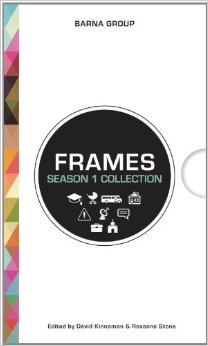
 Frames edited by Roxanne Stone produced by The Barna Group (Zondervan) $7.99 each Boxed Set of all nine, $59.99 DVD $29.99 These are simple books that are easy to explain (even though there are nice of them, and an accompanying DVD.) They each are attempting to “reframe” how we think about contemporary issues, and they offer upbeat info graphics to give you just enough data to be up to date on that topic. They have an essay, and then a shorter response. These are small pocket sized books, designed for those who want to dip into an good article, published as a small book, but really smaller then a typical book. Of course these are not designed to replace more substantive reading, but we applaud their important research — both in determining the topics (these are issues their research show to be important) and in their basic sense that people need short, well designed on-ramps to deeper, relevant Christian thinking. These came out, technically, the very end of 2013, but stores got them on the shelves in January, and we were early enthusiasts in 2014. We wrote about them, here, and want to honor them, here, now. Great stuff! What a great idea: big ideas in small packages.
Frames edited by Roxanne Stone produced by The Barna Group (Zondervan) $7.99 each Boxed Set of all nine, $59.99 DVD $29.99 These are simple books that are easy to explain (even though there are nice of them, and an accompanying DVD.) They each are attempting to “reframe” how we think about contemporary issues, and they offer upbeat info graphics to give you just enough data to be up to date on that topic. They have an essay, and then a shorter response. These are small pocket sized books, designed for those who want to dip into an good article, published as a small book, but really smaller then a typical book. Of course these are not designed to replace more substantive reading, but we applaud their important research — both in determining the topics (these are issues their research show to be important) and in their basic sense that people need short, well designed on-ramps to deeper, relevant Christian thinking. These came out, technically, the very end of 2013, but stores got them on the shelves in January, and we were early enthusiasts in 2014. We wrote about them, here, and want to honor them, here, now. Great stuff! What a great idea: big ideas in small packages.
We know several of the authors of these Frames booklets, by the way, and hate to play favorites, but Wonder Woman: Navigating the Challenges of Motherhood, Career and Identity by Kate Harris is especially well done. And who doesn’t want to read a bit more by Love Does author Bob Goff? The little one by Jon Tyson on the church — Sacred Roots — is urgent; Fighting for Peace by Carol Howard Merritt (on violence in our own culture) and Tyler Wiggs-Stevenson (on global peacemaking) are really important. I so respect Nicole Baker Fulgham, and glad she wrote the one on caring about public 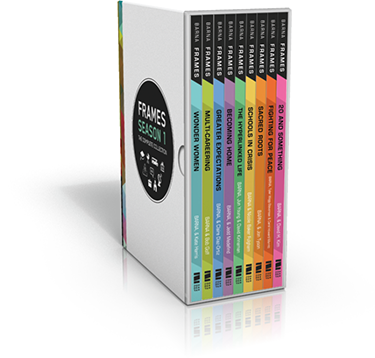 schooling. A few are on the hyper-linked lives we live, one is one our relationship with our technologies and devices and the info-overload and 24/7 expectations we have these days.
schooling. A few are on the hyper-linked lives we live, one is one our relationship with our technologies and devices and the info-overload and 24/7 expectations we have these days.
Oh heck, they are all good. Get the boxed set, and gather some friends to go through the presentations available on the Frames DVD. Congratulations to Barna Group, to Roxanne, and Dave Kinnamen for this clever and viable way to get folks reading a bit on important topics. Good job, gang!
HONORABLE MENTION: DORDT COLLEGE PRESS, CALVIN SEERVELD,
AND THE PUBLISHING EVENT OF THE YEAR
In December I wrote an extensive summary of all six of these handsome, extensive volumes of the collection writings, occasional pieces, and sundry articles, sermons, reviews, and speeches of one of the most interesting, tireless Kingdom scholars of our time. Seerveld is a colorful, passionate writer, deeply rooted in what must be called a Biblical world and life view, and Dordt College Press has given us a great gift by edited these various sorts of writings, grouping them by topic, and simultaneously releasing them in uniform covers. I hope you can take the time to read my essay, found under the “columns” tab at the website wherein I make the case that this philosopher of aesthetic theory and Christian art historian is very, very important to read, and that this publication of his wise and vibrant body of work is truly a publishing event.
There will be, I’m sure, a special honor in the Kingdom hall of fame for this project; we want to celebrate it now, as one of the great publishing events of recent years.
Kudos to John Kok and others who were involved. I was pretty keen on having an endorsing blurb on the back of one (Redemptive Art in Society) and that, too, by the way, was a special highlight of my year. Thanks to all who care. Read Seerveld!
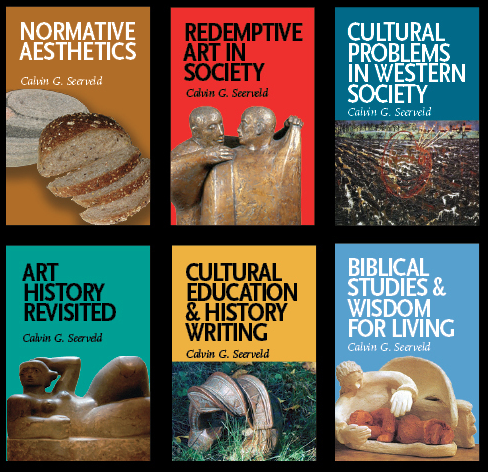
BEST RELIGIOUS PICTURE BOOK FOR CHILDREN
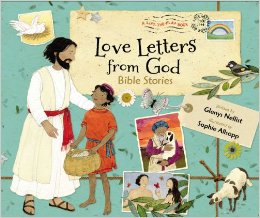 Love Letters from God Bible Stories written by Glenys Nellist illustrated by Sophie Allsopp (Zonderkidz) $16.99 Here is what I wrote in an earlier BookNotes, happily affirmed here, now: This is without a doubt one of the best designs in a children’s Bible story collection we’ve seen — it is colorful, fun without being cute, with a creatively designed part that sets it apart and brings it all home. Yes, it has engaging pictures, sidebars and graphic design on each two page spread; if that were all, it would still be much better than average and highly recommended. But there is also a little tipped in, lift the flap sort of letter or card, with a letter to the child in each one. In other words, it says in simple, personalized prose exactly how this passage teaches about God’s great love and faithfulness to the child. These notes are very colloquial, and talk about “being on Jesus’ team” and things being super-duper. It is child-like, just a little silly, even. This lift-the-flap feature isn’t so prominent as to distract from the pictures and the telling of the story, but is an extra, enhancing contribution. We love this book, and congratulate ZonderKidz for doing such fine work.
Love Letters from God Bible Stories written by Glenys Nellist illustrated by Sophie Allsopp (Zonderkidz) $16.99 Here is what I wrote in an earlier BookNotes, happily affirmed here, now: This is without a doubt one of the best designs in a children’s Bible story collection we’ve seen — it is colorful, fun without being cute, with a creatively designed part that sets it apart and brings it all home. Yes, it has engaging pictures, sidebars and graphic design on each two page spread; if that were all, it would still be much better than average and highly recommended. But there is also a little tipped in, lift the flap sort of letter or card, with a letter to the child in each one. In other words, it says in simple, personalized prose exactly how this passage teaches about God’s great love and faithfulness to the child. These notes are very colloquial, and talk about “being on Jesus’ team” and things being super-duper. It is child-like, just a little silly, even. This lift-the-flap feature isn’t so prominent as to distract from the pictures and the telling of the story, but is an extra, enhancing contribution. We love this book, and congratulate ZonderKidz for doing such fine work.
FUNNIEST BOOK WE’VE SOLD WELL THIS YEAR
Okay, who doesn’t want to give a shout out to Amy Pohler, but, ya know, we have to show you this. It’s been a fun year.
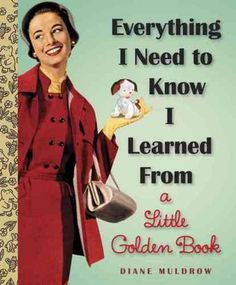 Everything I Need to Know I Learned from a Little Golden Book Diane Muldrow (Golden Books) $9.99 Yep. If you are a baby boomer or older, you have to see this. Maybe this is why Beth and I are in this work, since we, uh, yup, had or read these books, in all their old fashioned glory And we remember them!
Everything I Need to Know I Learned from a Little Golden Book Diane Muldrow (Golden Books) $9.99 Yep. If you are a baby boomer or older, you have to see this. Maybe this is why Beth and I are in this work, since we, uh, yup, had or read these books, in all their old fashioned glory And we remember them!
We just got into the shop the lovely little follow up, Everything I Need to Know About Love I Learned from a Little Golden Book which you should give to somebody you love this Valentine’s Day.
BookNotes
DISCOUNT
ANY ITEM MENTIONED
20% off
order here
takes you to the secure Hearts & Minds order form page
just tell us what you want
inquire here
if you have questions or need more information
just ask us what you want to know
Hearts & Minds 234 East Main Street Dallastown, PA 17313 717-246-3333
